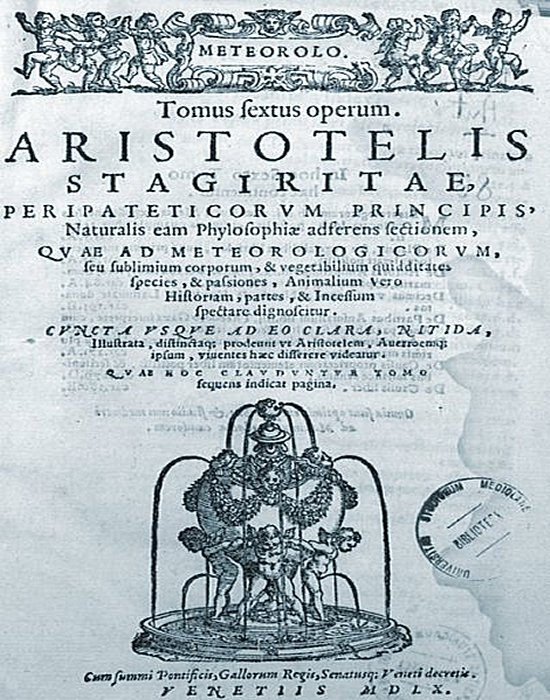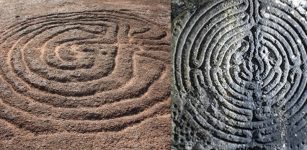Ancient Greeks Had Great Understanding Of Weather And Climate
A. Sutherland - AncientPages.com - Ancient cultures from the Aztecs of Mesoamerica to the Egyptians in Africa and Indians in Asia —became expert astronomers and predictors of seasonal weather patterns.
Ancient world cultures associated weather forecasting with religion and spirituality. Weather such as rain, drought, wind, and cloudiness were associated with a deity, or god and were worshiped in order to ensure good weather.

Aristotle is considered the founder of meteorology. He tried to explain the weather through the interaction of the four elements: earth, fire, air, and water.
Around 650 BC, the Babylonians tried to predict short-term weather changes based on the appearance of clouds and optical phenomena such as haloes.
By 300 BC, Chinese astronomers had developed a calendar that divided the year into 24 festivals, each festival associated with a different type of weather.
Rain gods and goddesses were particularly important, because rain influenced agriculture and construction projects. Tlaloc (Aztec), Set (Egyptian), and Indra (India), as well as Thor (Norse), Zeus (Greek), and Shango (Yoruba), are only some gods associated with rain, thunder, and lightning.

Aristotle's Meteorology is the earliest extant. Greek work on the subject, and is part of a larger project, following on from his studies of natural motion in the Physics, astronomy in On the Heavens, and the four elements in Generation and Corruption. Photo credits: wikipedia
However, it was the Greeks, who began the formal study of climate and, the word 'climate' is derived from the Greek word 'klima', meaning slope, referring to the slope or inclination and referring to the climate conditions created by the Sun’s angle. Moreover, ancient Greeks invented the term “meteorology,” the study of atmospheric disturbances.
Ancient Greeks, as well as other civilizations of that time, often attributed weather changes and natural phenomena to the gods. For example, lightning was a way for Zeus to show his anger, just as Thor in ancient Nordic mythology.
Ancient Greek mythology is an example of how early civilizations tried to explain the unexplainable at the time forces of nature, weather and astronomy.
Many ancient Greek gods and goddesses were elements of weather and seasons personified. Ancient Greeks also believed in Poseidon, god of sea and earthquakes, Helios, god of sun, Selene, goddess of moon, Hephaestus, god of volcanoes, Chione, goddess of snow, Zeus, king of all gods and god of sky, thunder, lightning and rain. All occurrences of favorable or poor weather were thought to be a direct result of godly intervention.
However, thanks to their continuous observation of nature, ancient Greeks had a great understanding of weather and climate in general. It may not have been as advanced as modern science but their basic knowledge helped them to better understand weather changes and find ways to benefit from them.
Aristotle is considered the founder of meteorology. His treatise (the oldest of all comprehensive works) known as 'Meteorology' discusses what Aristotle believed to have been all the affections common to air and water, and the kinds and parts of the earth and the affections of its parts. It includes early accounts of water evaporation, earthquakes, and other weather phenomena.
He tried to explain the weather through the interaction of the four elements: earth, fire, air, and water. Aristotle’s student Theophrastus produced the first book on weather signs, listing observations used to forecast weather, many of which are still used to this day.
In ancient Greece people used their knowledge to their advantage, focusing on the air’s movement, commonly known as wind, as well as the significance of the Sun and Moon positions in the sky in order to forecast phenomena such as tides and improve everyday tasks involving agriculture or sailing.
Written by – A. Sutherland - AncientPages.com Senior Staff Writer
Copyright © AncientPages.com All rights reserved. This material may not be published, broadcast, rewritten or redistributed in whole or part without the express written permission of AncientPages.com
Expand for referencesMore From Ancient Pages
-
 Sensational Discovery: 300,000-Year-Old Snapshot – Oldest Human Footprints From Germany Found
Fossils | May 12, 2023
Sensational Discovery: 300,000-Year-Old Snapshot – Oldest Human Footprints From Germany Found
Fossils | May 12, 2023 -
 When Did Humans Start Using Roads And What Civilization Built The First Paved Roads?
Archaeology | Oct 26, 2022
When Did Humans Start Using Roads And What Civilization Built The First Paved Roads?
Archaeology | Oct 26, 2022 -
 On This Day In History: Foundation Stone Of The Royal Greenwich Observatory In London Was Laid – On August 10, 1675
News | Aug 10, 2016
On This Day In History: Foundation Stone Of The Royal Greenwich Observatory In London Was Laid – On August 10, 1675
News | Aug 10, 2016 -
 Unique Female Viking Grave In Swedish Mountains Reveals Its Secrets
Archaeology | Jul 14, 2023
Unique Female Viking Grave In Swedish Mountains Reveals Its Secrets
Archaeology | Jul 14, 2023 -
 Intricate Mazes And Labyrinths: Mysterious Symbols Of Beauty And Confusion Or Communication Signals
Ancient Symbols | Jun 23, 2016
Intricate Mazes And Labyrinths: Mysterious Symbols Of Beauty And Confusion Or Communication Signals
Ancient Symbols | Jun 23, 2016 -
 Negev Desert’s Ancient Site Tells Story About Humans, Neanderthals Coexistence
Archaeology | Jun 19, 2021
Negev Desert’s Ancient Site Tells Story About Humans, Neanderthals Coexistence
Archaeology | Jun 19, 2021 -
 Brief History Of Abortion – From Ancient Egyptian Herbs To Fighting Stigma Today
Featured Stories | Oct 3, 2023
Brief History Of Abortion – From Ancient Egyptian Herbs To Fighting Stigma Today
Featured Stories | Oct 3, 2023 -
 Great Pyramid Puzzle: ‘Lost’ 5,000-Year-Old Piece Of ‘Dixon Relics’ Accidentally Found
Archaeology | Dec 17, 2020
Great Pyramid Puzzle: ‘Lost’ 5,000-Year-Old Piece Of ‘Dixon Relics’ Accidentally Found
Archaeology | Dec 17, 2020 -
 Face Of A Greek Girl That Lived 9,000-Years Ago Reconstructed In Athens
Archaeology | Jan 27, 2018
Face Of A Greek Girl That Lived 9,000-Years Ago Reconstructed In Athens
Archaeology | Jan 27, 2018 -
 Secret Tunnels Used By Knights Templar Leading To The Treasure Tower – Discovered
Archaeology | Oct 29, 2019
Secret Tunnels Used By Knights Templar Leading To The Treasure Tower – Discovered
Archaeology | Oct 29, 2019 -
 Explorer Discovered A Lost Underground World Beneath Big Sur In North America – But Why Cannot Anyone Else Find It Now?
Ancient Mysteries | Feb 12, 2019
Explorer Discovered A Lost Underground World Beneath Big Sur In North America – But Why Cannot Anyone Else Find It Now?
Ancient Mysteries | Feb 12, 2019 -
 On This Day In History: Black Death Arrived In Britain – On June 24, 1348
News | Jun 24, 2016
On This Day In History: Black Death Arrived In Britain – On June 24, 1348
News | Jun 24, 2016 -
 First Human Culture Lasted 20,000 Years Longer Than Thought – New Study
Archaeology | Jan 11, 2021
First Human Culture Lasted 20,000 Years Longer Than Thought – New Study
Archaeology | Jan 11, 2021 -
 Oldest Human Genome From The Iberian Peninsula Helps Reconstructing Human History
Archaeology | Mar 1, 2023
Oldest Human Genome From The Iberian Peninsula Helps Reconstructing Human History
Archaeology | Mar 1, 2023 -
 ‘Vandal’ Of Norwegian Viking Graves Identified But Charges Have Been Dropped!
Archaeology | Nov 9, 2020
‘Vandal’ Of Norwegian Viking Graves Identified But Charges Have Been Dropped!
Archaeology | Nov 9, 2020 -
 Hasankeyf – 12,000-Year-Old Mesopotamian City Will Be Destroyed – Decision Sparks Outrage And Controversy
Archaeology | Aug 28, 2019
Hasankeyf – 12,000-Year-Old Mesopotamian City Will Be Destroyed – Decision Sparks Outrage And Controversy
Archaeology | Aug 28, 2019 -
 2,500-Year-Old Phoenician Shipwreck Being Rescued By Archaeologists
Archaeology | Jul 4, 2023
2,500-Year-Old Phoenician Shipwreck Being Rescued By Archaeologists
Archaeology | Jul 4, 2023 -
 Why Was An Ancient High-Ranking Woman Buried Within The Abandoned Khar Nuur Fortress, Mongolia?
Archaeology | Aug 22, 2024
Why Was An Ancient High-Ranking Woman Buried Within The Abandoned Khar Nuur Fortress, Mongolia?
Archaeology | Aug 22, 2024 -
 How Many Ice Ages Has The Earth Had, And Could Humans Live Through One?
Featured Stories | Sep 26, 2022
How Many Ice Ages Has The Earth Had, And Could Humans Live Through One?
Featured Stories | Sep 26, 2022 -
 Diyu – Terrible Chinese Hell And Judgement Of God Yama
Chinese Mythology | Dec 18, 2018
Diyu – Terrible Chinese Hell And Judgement Of God Yama
Chinese Mythology | Dec 18, 2018
